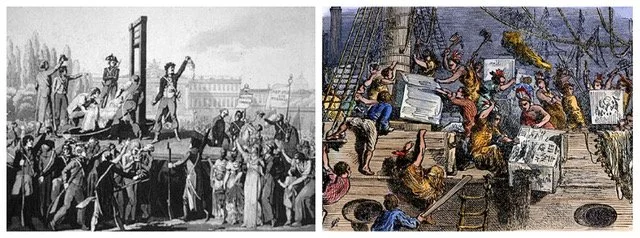A Tale of Two Revolutions
A few years ago, we took a family trip to Paris. My husband and I hadn’t been there since 1987, when we got engaged in the shadow of the Arc de Triomphe. Paris was just as I’d remembered: a stately and charming city with jaw-dropping museums and monuments of marble and granite. I can’t even imagine how many mountains had to die to build it.
There’s nothing quite like sitting in a Paris café, drinking espresso and choking on second-hand smoke while watching the traffic snarl on the Champs-Élysées. In Paris, you can eat bread to your heart’s content and throw your plastic water bottle in a regular trash can without guilt. You can bump into people and not say, “Excuse me.” The only thing you can’t do is find a restroom when you need one. And after all that coffee, you definitely will need one (fair warning).
While we were there, Paris was getting ready to celebrate Bastille Day, which is France’s version of our 4th of July, the start of the French Revolution. The French Revolution, if you remember 8th grade history class, led to the Reign of Terror and the despotic regime of Napoleon (who is also memorialized in a gigantic tomb in Paris). The more I thought about it (and I had a LOT of time to think about it, sitting on the top deck of a double-decker tour bus in the sweltering heat), I had to wonder why the French were so adamant about celebrating such a horrific event.
The French revolution was inspired by the American Revolution: oppressed people rising up against a corrupt and all-powerful regime. So far so good. So what happened? How does one compare the Boston Tea Party, where the only casualties were crates of tea, to the storming of the Bastille, where a hundred people died? Or the Americans’ heroic stand at Bunker Hill with the murder and beheading of thousands of people, most of them totally innocent?
What was the main difference between the two events?
In a word: God.
The French Revolution was influenced mainly by Enlightenment philosophers like Descartes and Rousseau, who espoused the virtue of Reason over Religion. The Church was enemy #1, more so than the monarchy. Certainly, the French Church was powerful and corrupt, but the revolutionaries did not just depose bad clergymen. They sought to destroy Christianity itself. They went so far as to rename Notre Dame “The Temple of Reason” and hold pseudo-religious rituals like the “Festival of Reason.” They guillotined a thousand priests, along with the monarchs and the “aristos.”
Yet history has shown that Reason alone does not lead to “Liberty, Equality and Fraternity” as the French had hoped. Pure reason does not equal perfect morality—just the opposite. When men ditch God for the leading of their own will, the result is chaos and terror. The revolutionaries simply killed everyone who stood in the way of their New Order. The end result was the desolation of France and the rise of a supremely powerful human will: Napoleon.
Nearly every revolution in history has led to even greater misery, murder, and oppression. The Third Reich in Germany, the Communist Revolutions of Russia and China, the Khmer Rouge in Cambodia, the Islamic Revolution in the Middle East, just to name a few.
But the American Revolution was a whole different story.
The American founders were admirers of the Enlightenment, like the French. They believed in the classical model of government passed down from Antiquity. But they also knew that a government not subject to the law of God would run amuck, becoming even worse than the regime it sought to replace. The American Revolution was extraordinary because it succeeded—it was the first (and last) revolution to establish a lasting peace, a stable government and a free people, “under God.”
Now that is an achievement worth celebrating.
Happy 4th!
Gina Detwiler is the author of the award-winning Forlorn series and co-author with Priscilla Shirer of the bestselling Prince Warriors series. She also wrote The Ultimate Bible Character Guide and the Ultimate Bible Character Devotional. Find out more at www.ginadetwiler.com

